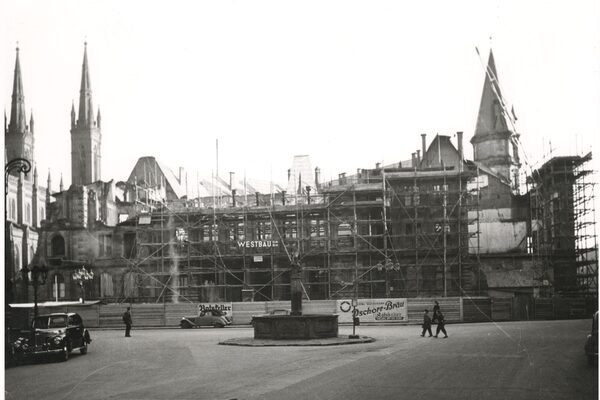Symposium "80 years after the end of the war: A new democratic beginning in the Rhine-Main region"
The Wiesbaden City Archive, together with the KulturRegion FrankfurtRheinMain and the Hessian State Center for Political Education, is hosting a symposium on May 15.
Municipalities are the foundation of the democratic state structure. National Socialist rule eroded their self-government from 1933 onwards and eventually dissolved them completely. Immediately after the end of the war in 1945, the Allied occupying powers began to rebuild the municipal administrations in Wiesbaden, as elsewhere. Cities, municipalities and districts were given a key role in the democratization of political life in Germany.
The reception of refugees and displaced persons, war damage and, in particular, the lack of housing and food were the most pressing problems. At the same time, municipal care centers for people persecuted for political, racial and religious reasons were set up in Hesse to care for the victims of the Nazi regime. The first confrontation with the crimes committed during the National Socialist era began.
On the 80th anniversary of the end of the Second World War and the liberation by the Allies, the symposium asks what the reconstruction of local democracy looked like after 1945 in Wiesbaden and other smaller and larger municipalities. Based on this, it is important to consider the overall social significance of the municipalities as a "school of democracy" and an important link between citizens and politics.
The symposium is a joint event of the Wiesbaden City Archive and the KulturRegion FrankfurtRheinMain in cooperation with the Hessische Landeszentrale für politische Bildung and with the support of the Volkshochschule Wiesbaden.
Program
9.30 to 9.40 a.m. | Greetings
Dr. Hendrik Schmehl, Head of Cultural Affairs of the State Capital Wiesbaden
Dr. Jennifer John, Managing Director of KulturRegion FrankfurtRheinMain gGmbH
Felix Münch, Permanent Representative of the Director of the Hessian State Center for Political Education
10 to 10.30 a.m. | Impulse
Conquest - liberation - and now? The historiographical significance of the end of the war
after 1945 using the example of Wiesbaden
Dr. Peter Quadflieg (Wiesbaden City Archive)
10.30 to 11 a.m.: Coffee break
11 a.m. to 12.30 p.m. | Morning panel
The end of the war and a new beginning in the Rhine-Main region: local examples
Each presentation includes 10 minutes of discussion
11 to 11.30 a.m.
The end of the war in Aschaffenburg in 1945: caesura or new beginning?
Professor Frank Jacob (Nord Universitet, Norway)
11.30 a.m. to 12 noon
The end of the war in Darmstadt in 1945
Dr. Sandra Zimmermann (Darmstadt City Archive)
12 to 12.30 p.m.
Oberursel 1945/46: Camp King, Eugen Kogon and the Oberursel Circle
Sylvia Goldhammer (Oberursel town archive)
12.30 to 13.15 Lunch break
13.15 to 14.15 hrs | Afternoon Panel I
The development of state and democratic structures
Each presentation includes 10 minutes of discussion
13.15 - 13.45
A new democratic beginning in the district of Usingen - a workshop report
Gregor Maier (Hochtaunuskreis district archive)
13.45 - 14.15
"For all who are of good will". Walter Kolb and the new democratic beginning in Frankfurt am Main
Dr. Thomas Bauer (Institute for City History Frankfurt am Main)
14.15 - 14.45: Coffee break
14.45 - 15.45 hrs | afternoon panel II
Test for the young democracy: Elections and reappraisal
Each presentation includes 10 minutes of discussion
14.45 to 15.15
A new beginning or a return to the past? The local elections of 1946 in the Rheingau
Oliver Mathias (Rüdesheim am Rhein)
15.15 to 15.45
Legal reappraisal of Nazi crimes in a small town. The so-called "Flörsheim Kristallnacht Trial" from May 9 to 14, 1949
Dr. Bernd Blisch (City of Flörsheim)
3.45 p.m. to 4 p.m.: Break
16 to 17.15 hrs | Round Table
80 years on: The end of the war as myth or obligation? How to talk about responsibility.
Lisa Sommer (Stiftung Stadtmuseum Wiesbaden), Margit Sachse (Lichtenbergschule Darmstadt, currently Évreux), Thomas Altmeyer (Geschichtsort Adlerwerke Frankfurt am Main), Dr. Markus Häfner (Städtische Museen Hanau), moderated by Kay-Hermann Hörster
(KulturRegion FrankfurtRheinMain gGmbH)
17.15 to 17.30 | Final discussion
Optional: 7.30 pm | Commemorative event on the end of the war in Hanau
"About wars and how to end them"
With lecture by Leibniz Prize winner Professor Dr. Jörn Leonhard (Department of History, Albert-Ludwigs-Universität Freiburg): "On wars and how to end them"
Wallonian Church, Französische Allee 12, 63450 Hanau
City archive
Address
65197 Wiesbaden
Postal address
65029 Wiesbaden
Arrival
Notes on public transport
Public transportation: Bus stop Kleinfeldchen/Stadtarchiv, bus lines 4, 17, 23, 24 and 27 and bus stop Künstlerviertel/Stadtarchiv, bus line 18.
Telephone
- +49 611 313022
- +49 611 313977
Opening hours
Opening hours of the reading room:
- Monday: closed
- Tuesday: 9 a.m. to 4 p.m.
- Wednesday: 9 am to 6 pm
- Thursday: 12 to 16 o'clock
- Friday: closed
